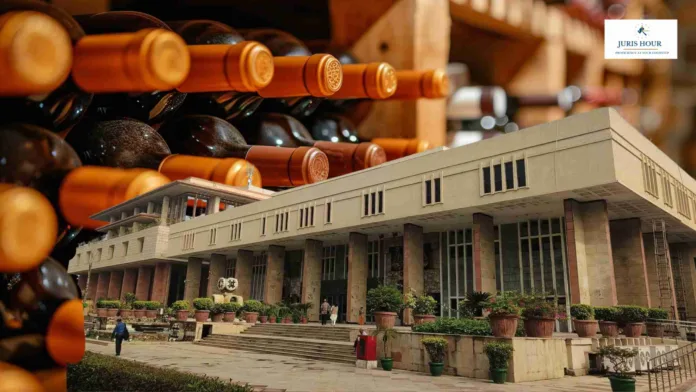The Delhi High Court has quashed reassessment against departmental stores selling wine and beer.
The bench of Justice Vibhu Bakhru and Justice Tushar Rao Gedela has observed that there was no allegation in the notice issued under Section 148A(b) of the Income Tax Act that the cash deposited by the Assessee in its bank account during the demonetization period was disproportionately higher in comparison with the cash deposited during the corresponding period in the previous financial year. Thus, the Assessee had no opportunity to provide any explanation in respect of such allegations.
The Assessee is a partnership firm engaged in the business of operating a chain of departmental stores. The Assessee asserts that during the relevant assessment year (AY 2017-18), it was running seven departmental stores in Delhi and held the necessary licenses for the sale of wine and beer. Being involved in retail trade, more than 90% of its sales were made in cash, which the Assessee regularly deposited into its bank accounts.
The Assessee filed its return of income on 30.10.2017 for AY 2017-18 declaring a total income of Rs. 26,30,730. In its return, the Assessee disclosed that an amount of Rs. 6,23,39,100 was deposited in the bank during the period from 09.11.2016 to 30.12.2016 [the demonetization period].
The Assessee’s return for AY 2017-18 was selected for scrutiny and the Assessing Officer [AO] issued a notice dated 24.09.2018 under Section 143(2) of the Act. One of the reasons for selecting the case for scrutiny was to examine the cash deposits made by the Assessee during the demonetization period.
During the assessment proceedings, the AO examined various issues, including the source of the cash deposits made by the Assessee during the demonetization period. To examine the genuineness and source of the cash deposited, the AO issued notices under Section 142(1) of the Act, seeking details from time to time.
In response to the aforesaid notices, the Assessee submitted replies and provided details of monthly cash deposits, cash sales for the period 2016, and other relevant information. The Assessee explained that it is engaged in retail trade and operates seven departmental stores in Delhi, where more than 90% of the sales are made in cash. The Assessee clarified that the source of the cash deposits was the receipts from sales made in the normal course of business.
The Assessee explained that cash sales are a routine feature of retail business. In this regard, the Assessee also provided details of monthly cash deposits, cash sales, and an analysis of month-wise cash sales and cash deposits for the year 2015 and year 2016, among other relevant information.
It was alleged that during the assessment year under consideration, the transactions, as mentioned, aggregating Rs. 17,80,23,257, remained unexplained and the same were not considered while passing the assessment order under Section 143(3). It was also alleged that these transactions were not disclosed in the income tax returns filed by the Assessee. The aforesaid notice was followed by another notice dated 14.02.2024 issued under Section 148A(b) of the Income Tax Act.
The court held that the order passed under Section 148A(d) of the Income Tax Act had travelled beyond the information furnished to the Assessee, which, according to the AO, was suggestive of its income escaping the assessment. Thus, the impugned order passed under Section 148A(d) of the Income Tax Act cannot be sustained and is set aside.
The court remanded the matter to the AO to consider the question afresh. The Assessee is at liberty to respond to the information as set out in the impugned order passed under Section 148A(d) of the Income Tax Act.
Case Details
Case Title: J. G’s Departmental Store Versus Income Tax Officer
Case No.: W.P.(C) 13669/2024 & CM APPL. 57292/2024
Date: 15.04.2025
Counsel For Petitioner: Ved Jain, Mr. Nischay Kantoor, Ms. Soniya Dodeja, Mr. Divyansh Dubey and Mr. Govind Gupta
Counsel For Respondent: Shlok Chandra, Standing Counsel with Ms. Naincy Jain
Read More: Dealers Can’t Claim ITC For Purchases Linked To Exempt Sales Under UPVAT Act: Supreme Court





